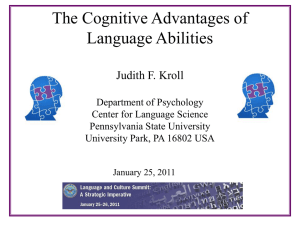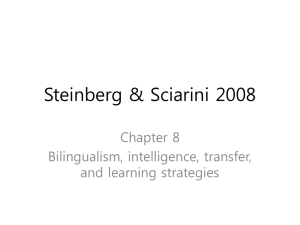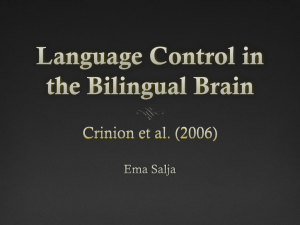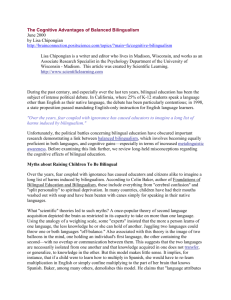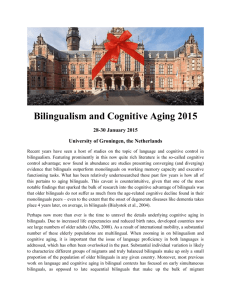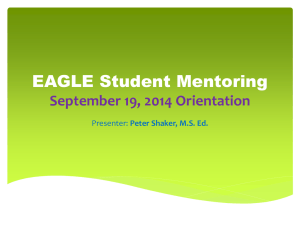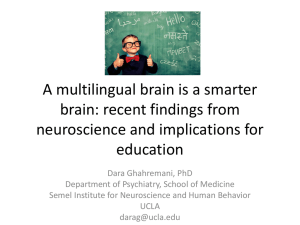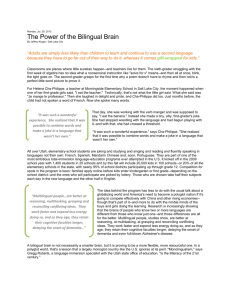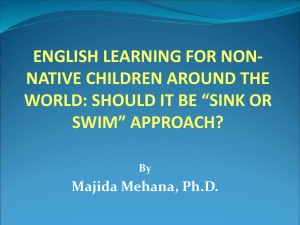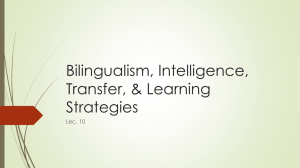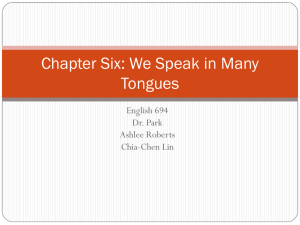File
advertisement
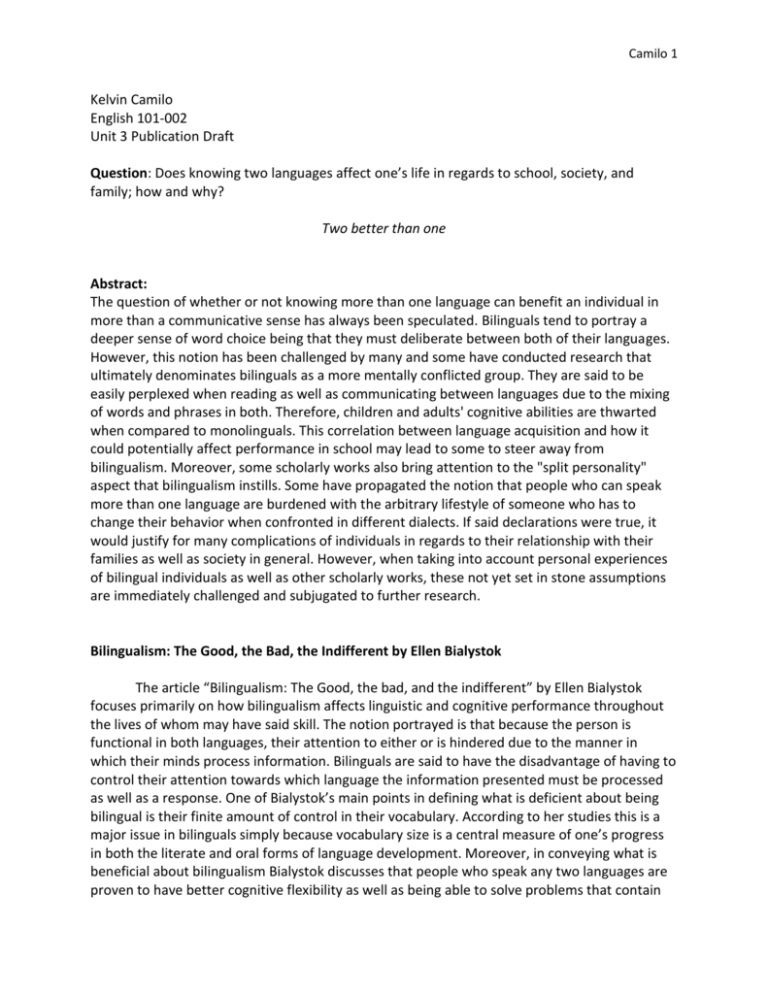
Camilo 1 Kelvin Camilo English 101-002 Unit 3 Publication Draft Question: Does knowing two languages affect one’s life in regards to school, society, and family; how and why? Two better than one Abstract: The question of whether or not knowing more than one language can benefit an individual in more than a communicative sense has always been speculated. Bilinguals tend to portray a deeper sense of word choice being that they must deliberate between both of their languages. However, this notion has been challenged by many and some have conducted research that ultimately denominates bilinguals as a more mentally conflicted group. They are said to be easily perplexed when reading as well as communicating between languages due to the mixing of words and phrases in both. Therefore, children and adults' cognitive abilities are thwarted when compared to monolinguals. This correlation between language acquisition and how it could potentially affect performance in school may lead to some to steer away from bilingualism. Moreover, some scholarly works also bring attention to the "split personality" aspect that bilingualism instills. Some have propagated the notion that people who can speak more than one language are burdened with the arbitrary lifestyle of someone who has to change their behavior when confronted in different dialects. If said declarations were true, it would justify for many complications of individuals in regards to their relationship with their families as well as society in general. However, when taking into account personal experiences of bilingual individuals as well as other scholarly works, these not yet set in stone assumptions are immediately challenged and subjugated to further research. Bilingualism: The Good, the Bad, the Indifferent by Ellen Bialystok The article “Bilingualism: The Good, the bad, and the indifferent” by Ellen Bialystok focuses primarily on how bilingualism affects linguistic and cognitive performance throughout the lives of whom may have said skill. The notion portrayed is that because the person is functional in both languages, their attention to either or is hindered due to the manner in which their minds process information. Bilinguals are said to have the disadvantage of having to control their attention towards which language the information presented must be processed as well as a response. One of Bialystok’s main points in defining what is deficient about being bilingual is their finite amount of control in their vocabulary. According to her studies this is a major issue in bilinguals simply because vocabulary size is a central measure of one’s progress in both the literate and oral forms of language development. Moreover, in conveying what is beneficial about bilingualism Bialystok discusses that people who speak any two languages are proven to have better cognitive flexibility as well as being able to solve problems that contain Camilo 2 conflicting or misleading cues. This advantage derives from the fact that bilinguals are constantly differentiating two mindsets at once so their ability to point out any ‘curveballs’ thrown at them is much greater than monolinguals. However, these two mindsets cause bilinguals to code switch, leading them to insert words or phrases of the opposite language unintentionally. Although Bialystok did mention beneficial aspects of bilingualism, this article primarily deems the trait to be conflicting and uncomplimentary to the person. The summary does in fact depict what is to come in reading the work but in a more indifferent manner. The article aids me in understanding primarily my own narrative simply because the results of the studies mentioned explain some of my own questions of my bilingual experience. Bialystok brings up the fact that “bilinguals use each of their languages less often than monolinguals, creating “weaker links” among the relevant connections required for rapid and fluent speech production”(Bialystok pg. 4) which directly correlates the predicament in my narrative “Native Tongue-Twist” where I lament the fact that my proficiency in Spanish deteriorated as I learned and practiced English “I practically swapped the adversity of not knowing English for a less understanding of my own native tongue”(Kelvin pg. 3). In regards to my own question, bilingualism directly affects the individual in school according to this article. The notion that bilinguals naturally have a predisposition to having a limited vocabulary troubles me. Although the data from which Bialystok derives her statements are legitimate, what has not been taken in account is the demographic of the people tested. In my case and according to Lisa Chipongian in “The Cognitive Advantages of Balanced Bilingualism” language attributes “are not apart in the cognitive system, but transfer readily and are interactive” meaning vocabulary is not a bystander of knowing two languages. I am in accordance with what Bialystok discusses when she states that bilinguals are advanced in cognitive flexibility. Judging from my own experience I find it easier to multitask being that I constantly do because I am bilingual. My brain processes information in both languages I know and if I were to not comprehend in one, I would innately code it to the other, contrary to what Bialystok believes when stating that the two would conflict with one another. If her claim were to in fact be a set in stone fact, that aspect of bilingualism would primarily affect the individual in every aspect of my question including society, school as well as family. Although every source does not comply with one another in regards to whether or not bilingualism affects one's life positively or negatively, they each have concrete points that challenge one another. Monolinguals may have an inauspicious disadvantage against bilinguals in regards to their ability to point out conflicts; they are however favored to excel according to Bialystok. Bilinguals are too burdened with confusion among their two languages that they are not able to build a competent understanding of either as well as build an extensive vocabulary. Bilinguility and Bilingualism by Hamers and Blanc Hamers and Blanc discuss the regular use of two languages by bilingual individuals and how it has been proven to show a significant impact on language and cognitive functioning. In this book they present four aspects of this influence. Hamers and Blanc study differences between monolinguals and bilinguals in the acquisition of language in children and adults’ linguistic processing, particularly in terms of their ability to retain vocabulary. They state that Camilo 3 children learning two languages from birth comply with the same milestones for language acquisition as mono- linguals do but they generally have a smaller vocabulary in each language than monolingual children learning only a single language. Adult bilinguals normally require longer periods of time to retrieve individual words than monolinguals do. Moreover, they also generate fewer words when asked to satisfy a constraint such as alternative words such as synonyms as well as phrases. Hamers and Blanc propose similar information from their studies as Ellen Bialystok does in her work “Bilingualism: The Good, the bad, and the indifferent”. They both are in agreement that children as well as adults lack the same capacity in learning vocabulary when compared to monolingual individuals. Furthermore, they also comply with each other in their claim that monolinguals, because their minds process the world in one language, are more likely to have a better proficiency in understanding a language the bilingual may know as well. This conflicting ‘division of the mind’ is examined by Aneta Pavlenko as she tests bilinguals’ presentations of themselves and ultimately concluding that they “ feel different in both languages, relate to people differently, and have a different perspective of the world”(Pavlenko pg. 17). In relation to this, in Wendy’s personal narrative “Situaciones Incomodas” she speaks of how her parents would often make her translate conversations from English to Spanish. The complicating factor of these conversations arises when she attempts to change the tone in some of the more confrontational discourses. She stated that “those events made me realize that a lot of emotion is lost in translation and can change the significance of the words said”. This realization she comes to depicts the same outcome as Hamers and Blanc propose that bilinguals take on the role of two different people when confronted in either language. In my personal narrative I portray this sense of favoritism towards my language of heritage when talking about my city “Lawrence isn’t like most cities in Massachusetts being that over ninety percent of the population is Hispanic so the need for English is not as prominent as it is in other regions. I used this aspect as a scapegoat, hanging around with mostly Spanish speakers” (Kelvin pg. 1). I too am an example of this proposal that bilinguals are different when confronted in different languages. However, my perspective of the world does not change. The world and the people that populate it are not something that directly affects me because I am bilingual. In regards to the world the fact that I am bilingual simply provides me with an additional resource of communication if I were to travel to any region where I may happen to speak their language. . These concepts, in regards to my question, explain how bilinguals are affected in every aspect such as school, society, and family. Their duo like personalities can directly affect their ability to establish relationships with people out of their own kin. The bilingual individual may feel a more sense of comfort when spoken to in their language of origin, leading them to be a more accommodating to someone who can directly relate to their native culture. This can also affect their educational lives if their teachers and colleagues cannot communicate in the more language the individual is more accustomed to. The Cognitive Advantage of Balanced Bilingualism by Lisa Chipongian This source directly goes on to state specific advantages of people who speak more than one language have over monolingual individuals. Author Lisa Chipongian initiates her claim by Camilo 4 first countering the myths Colin Baker propagates in his work “Foundations of Bilingual Education and Bilingualism” in stating that it causes things like cerebral confusion as well as split personalities. Moreover, she then forwards scholarly work that agree with her claim that bilingualism is in fact beneficial rather than a detrimental skill people fool heartedly pursue to acquire. She starts off with evidence in the early stages of mankind saying that children, when taught a second language, gain skills such as analogical reasoning and creativity. The same idea that bilingual individuals have different personas in each language is also evident in Chipongian’s article, “knowing two languages is much more than simply knowing two ways of speaking….it seems evident that the mind of a speaker who has in some way attached two sets of linguistic details to a conceptual representation, whether in a unified or discretely arranged system, is diverse”. This correlates to what Pavlenko represents when talking about how in a narrative she has read an immigrant’s learning of a language, apart from her own has made her literally into that culture. Her mother deemed her as “English” which Pavlenko interprets as “becoming cold” (Pavlenko 34). This ties to the aspect of how bilinguals relate to others differently. In this case, the mother of the immigrated family felt that her daughter had forsaken her after her learning English. Chipongian serves mostly as the intermediate between the “myths” of bilingualism counters when stating that they are either under-researched or further examined and later proven to be erroneous. She justifies the cognitive deficit Hamers and Blanc mention when discussing the lexical capacity of children in stating that “a bilingual must attain a threshold level of linguistic competence both in order to avoid cognitive deficits and allow the potentially beneficial aspects of becoming bilingual to influence their cognitive growth” (Chipongian pg. 1). She describes this threshold as the capacity to comprehend the school curriculum and take part in classroom activities in either language. In essence, it is arbitrary to declare that monolinguals precede bilinguals in competence at school as well as in society. Conclusion The controversy of whether bilingualism is a beneficial trait to acquire or simply a cognitive hindrance is one that could never be proven. There are some studies that adhere to bilingualism's positive roles in both children and adults as well as there are those that oppose. In my personal experience I have been subject to both instances. Communication with family as well as society has been directly affected by my knowledge of English and Spanish. However, both have their positives and negatives. It is because that I am bilingual that I sometimes interchange words and end up speaking 'Spanglish'. This aspect of bilingualism is typical in Spanish-English speaking individuals yet not so prominent in those from Asian and European decent. This is due to the relativity between the languages in terms of their grammar as well as alphabet in which Spanish has more cognates than either. It is because of this fact that any conclusions denouncing bilingualism can only be true for certain groups of individuals and not all bilinguals. The demographic of people is essential in determining the effects of knowing more than one language in regards to society, school, and in families.
